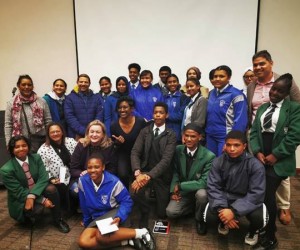Recently, Women in AI (WAI), a non-profit do-tank with a mission of increasing female representation and participation in AI, launched its Cape Town chapter in partnership with Stellenbosch University. The aim: to create an environment that encourages the development of females in this 4IR industry.
Natalie R, Founder of Robots Can Think and Leader of the Education Stream for WAI in South Africa, opened the event by taking the audience on a journey of a re-imagined future where AI presents a blank canvas on which equality and opportunity can be painted. “AI is everywhere in tech right now. It is said to be powering everything from our TVs to our toothbrushes. In my view, AI simply means if known, then complete it. If I know a process is repetitive, then automate it using AI technology known as Robotics Process Automation. If I know historic data, then publish forecasting models, predictions and insights by using AI technology known as Machine Learning. If I know the composition of ARVs and its effect on fighting the AIDS virus in the human body, then allow me to learn the processes faster, propelling me towards a cure. If I know, then simply complete it. That’s basically what AI is, so why are we scared?
“AI sees no race, no gender, no rural or urban social economics, no rich or poor, degree versus no degree. Opportunity exists whether I’m in Welkom or Stellenbosch, Soweto or Johannesburg, the playing field is levelled with AI. Students without a degree have the same opportunities as those with a degree. What type of thinking and what kind of institutions do we need to create a world where everyone has the chance to enjoy the highest level of human development? While we may not see equality in our lifetime, we will position a generation for opportunity.”
WAI Ambassador for South Africa, Lisel Engelbrecht, added: “In simple terms, AI is the mechanism to replicate human intelligence. AI has been around for quite a long time; it first made its appearance in the 1950s but didn’t really take off. Then round about 2011, AI started to get this shining light again. Now, 2.5 quintillion bytes of data are created every day. It is anticipated that $13 trillion in activity will be generated by 2030 and that 30% of the jobs in their current form will be impacted. This is one of the reasons why I wanted to join Women in AI, and join the search for AI communities, because it’s all about how we, as humans, will transform and adopt the fourth industrial revolution. Unfortunately, women will be impacted the most because we tend to go into administrative roles like marketing, office administration and bookkeeping. These types of roles will be automated in time to come, but it doesn’t mean that women won’t have a space to fill in the domain that is coming around. Globally, 22% of AI professionals are female, so, there will be a lot of work for us to do.”
She explained WAI’s various initiatives which include mentor-mentee engagement, events with specialists in this area, an education stream providing young people under the age of 18 with access to AI courses as well as an education stream for women who are already in the workforce to see how WAI can help them to adopt this new technology.
Engelbrecht also revealed WAI’s plans to expand within the African continent. “We’ve got a lot of countries we’re going to target. The next country we will be targeting is Nigeria, especially with Google launching there, and then Ethiopia. Ultimately, we want to build a community that’s passionate about gender inclusiveness for women of all ages and from all walks of life and to help the rest of the world adopt this.”
Nico Koopman, Vice-Rector: Social Impact, Transformation & Personnel at Stellenbosch University, shared: “As an institution, we have formulated academic intelligence through diversity, and we have committed to innovation through technology, computational thinking and AI. I believe the more diverse you become, the more excellent you are. Our work in technology, computational thinking and AI will become more excellent the more diverse we become. We need the duet of technology and excellence in diversity so that when we sing, we bring harmony, thriving spirits, thriving societies and thriving individuals.”
Dr Trudie Sandrock, a lecturer in the department of Statistics and Actuarial Science at Stellenbosch University, captured the audience’s attention by allowing attendees to re-imagine music with AI. The classical music compositions played, coupled with how the Shazam app uses AI to create a relationship between music and emotion, held the audience spellbound.
AI in Africa, which works with females at underprivileged schools around South Africa, sponsored 20 learners to attend the event, giving them a glimpse of what the future holds and how they are part of shaping the future. One learner, Kauthar Campbell from Westridge High School, said that the event opened her mind to the many opportunities that are awaiting her.
Not only did the scholars get to attend the event, but Prof Wim Delva, Acting Director at Stellenbosch University’s School for Data Science and Computational Thinking, handed over a R5,000 donation from Stellenbosch University to fund their participation in an online course that will see them receive basic AI certification. Prof Delva also launched the School’s Accelerator in Data and Decision Data Science programme which will run from the 20 January to 7 February 2020.
The collaboration between prestigious universities and NGOs to bring equality and opportunity to underprivileged scholars is exactly the future painted by Natalie R.
For more information about WAI, go to https://www.womeninai.co.za







